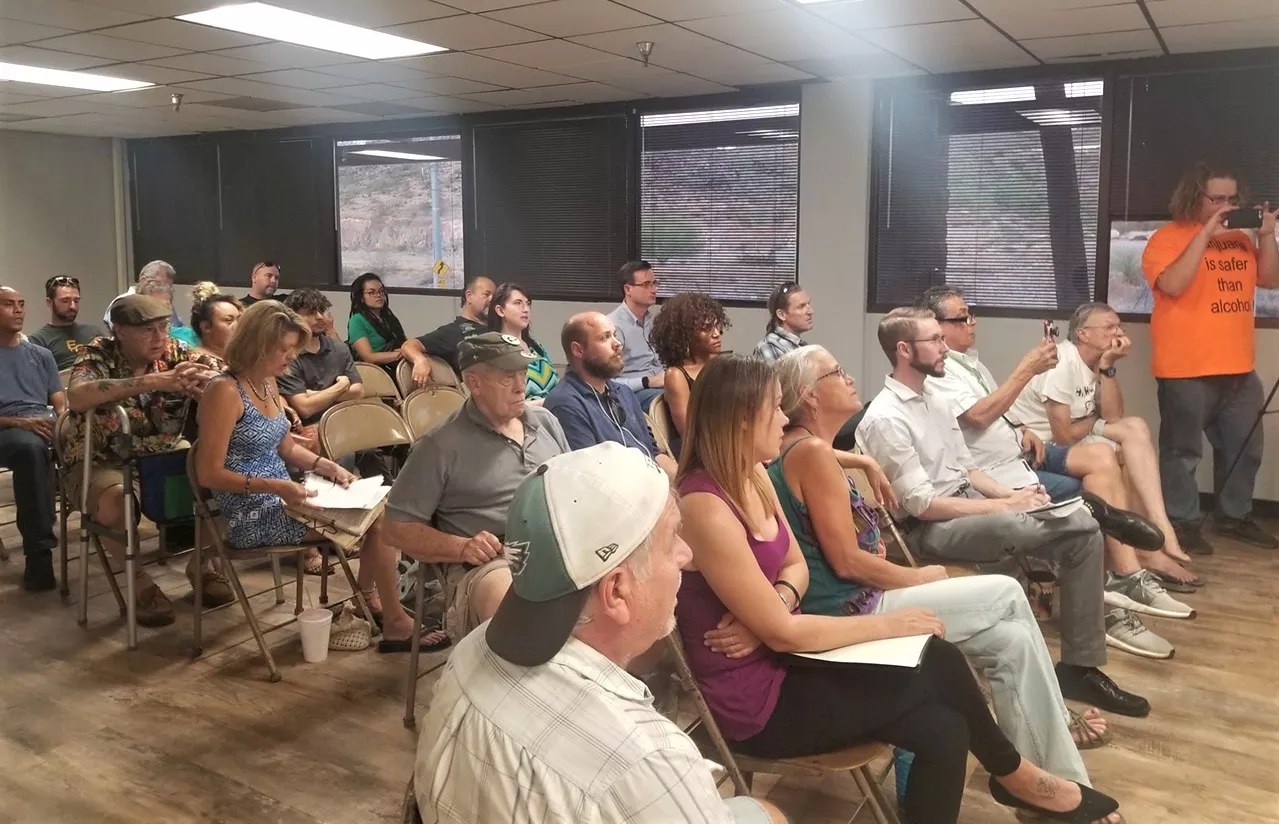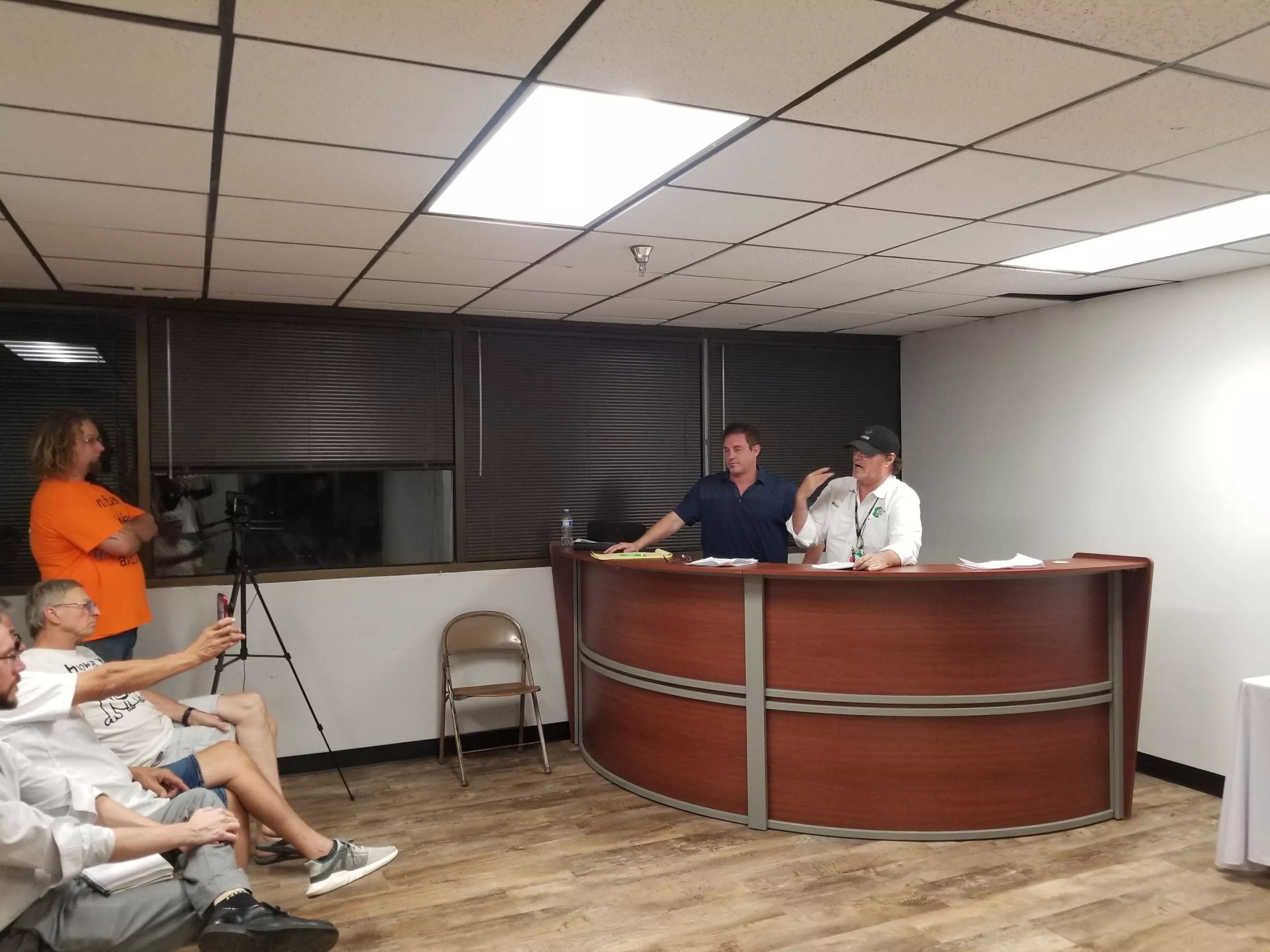
Natasha Yee

Audio By Carbonatix
How will the Arizona medical marijuana program fare if voters approve an adult-use legalization measure next year?
A representative of the Arizona Dispensaries Association, which is sponsoring the campaign for the measure, joined cannabis experts on Wednesday night for a discussion on that and other topics before a small audience of medical marijuana patients and other interested people at an office on Cave Creek Road in north Phoenix.
Mikel Weisser, the executive director of the Arizona chapter of NORML, the National Organization for the Reform of Marijuana Laws, led the talk in conjunction with Tom Dean, a cannabis attorney.
The ADA’s measure, called the Smart and Safe Act, is likely to be well-funded enough to gather the required 237,645 valid voter signatures to make the November 2020 ballot. Then, it’ll be up to voters. If the measure passes in 2020, adults 21 and over will be able to possess up to an ounce of marijuana at a time and medical marijuana patients can continue to hold up to 2.5 ounces of cannabis every two weeks. Adults could also grow up to six plants in their home, with a maximum of 12 plants in households with two or more people.
About 30 attendees seated in folding chairs raised concerns during the meeting about how legalization will affect medical marijuana cardholders.
“It seems that our adult-use market may have better access to recreational products than a medicinal patient may have to their medicine,” said Amanda Gardner, who recently moved to Arizona after working in the cannabis industry on the East Coast. “It’s easy to forget about the patients in this new age of cannabis.”
Gardner raised concerns about having access to Rick Simpson Oil, or RSO, a cannabis concentrate that – anecdotally – is said to have numerous medical benefits. She pointed out the considerable quantity of cannabis needed to make RSO, if she had to craft it on her own. “I have personally made RSO, and to make just a few grams of RSO, it takes about a quarter-pound of cannabis.”
Tim Sultan, ADA executive director, tried to curb patients’ anxiety by explaining that dispensaries in Arizona, similar to other legal states, would have separate registers for recreational buyers and medicinal ones. He also pointed out that patients will pay less in taxes for their herb, will be allowed to have a higher cannabis allotment, and will enjoy more rights in regard to employment and other areas.
The 2010 Arizona Medical Marijuana Act put no special tax on marijuana, but made it subject to state and city sales taxes, which average between 8 percent and 9 percent when combined. The Smart and Safe Act would also be subject to those retail sales taxes, but adds a 16 percent excise tax on top of them.
Michelle Westenfield, president of the Phoenix Cannabis Coalition, did not seem impressed. “Some of the people who are very excited for recreational use are planning on looping – they think that they are going to be able to do this. So as a patient bound by my allotment, they already have a plan.”
Looping is a practice in cannabis retail where consumers purchase their allotted bud at a dispensary, then “loop” around the block, returning to that dispensary to buy more, essentially gaming the system. The Sweet Leaf dispensary chain in Colorado serves as a cautionary tale for allowing this illegal practice – owners of the business were sentenced to one year in prison in January.
The crowd was smaller than Weisser had originally hoped, but highly interested in the subject. Patients raised many concerns, like what would happen to women and parents if a baby’s bloodstream had THC in it, how the new law would help fund the state’s education system, expungement procedures for people with past cannabis offenses on their record, accurate DUI testing, and how dispensary licensing would work.

Attorney Tom Dean and Arizona NORML’s executive director, Mikel Weisser, summarize the Smart and Safe Act measure for community members.
Natasha Yee
Though the excise tax from the measure would fund community colleges, it would not contribute money directly to K-12 education in Arizona, the experts explained. Sorry, #RedforEd.
Inhabitants of rural areas were concerned about a shortage of dispensaries – one dispensary is allowed for every 10 pharmacies, same as the medical marijuana program. Most dispensaries are now located in urban areas, where most of their customers live.
People also raised concerns about the direction the industry is headed in. “It’s not just about the plant, it’s about its integrity. A lot of companies are looking to cut corners as we move into corporatization,” Gardner said. “We just can’t forget that there are so many people out there who need this plant.”
Sultan talked a little about the expected opposition from prohibitionists. They’re “concerned that it will become pervasive in the community, particularly out on the roads. There is also a fear that children will partake.”
Critics of the measure may be upset as well about limited licensing for dispensaries, he said, noting that it would be impossible to please everyone.
Some advocates indicated they would support the measure even if it wasn’t perfect.
“Prohibition doesn’t work,” said Jack Wilborn, a retired Glendale reserve police officer who is now an activist with the Law Enforcement Action Partnership. “When you prohibit something, you lose control of it. I personally had experience with people who basically had their life ruined over a roach.”